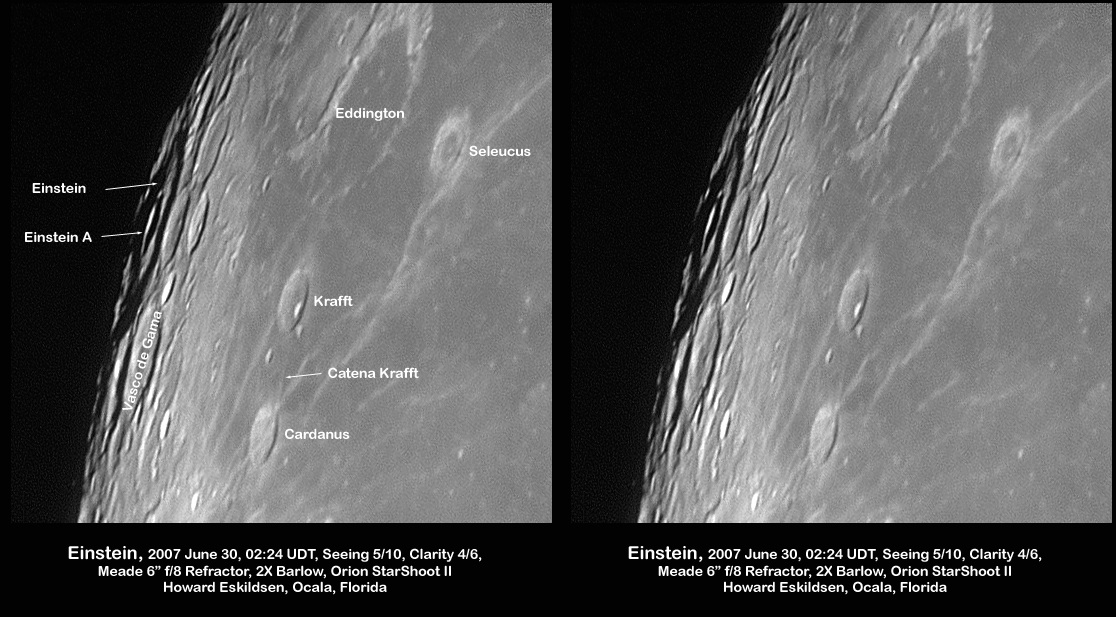|
|
| Line 1: |
Line 1: |
| | __NOTOC__ | | __NOTOC__ |
| | =Accidental Concentricity= | | =Accidental Concentricity= |
| | + | <div class="post" id="post-1231"> |
| | | | |
| − |
| + | <div class="storycontent"> |
| − | <div class="post" id="post-1231">
| + | <p>[[File:Einstein 070630 0224Pair.jpg|Einstein 070630 0224Pair.jpg]]<br /> |
| − |
| |
| − | <div class="storycontent">
| |
| − | <p>[[File:Einstein 070630 0224Pair.jpg|Einstein 070630 0224Pair.jpg]]<br />
| |
| | <em>image by [mailto:HowardEskildsen@msn.com Howard Eskildsen], Ocala, Florida</em></p> | | <em>image by [mailto:HowardEskildsen@msn.com Howard Eskildsen], Ocala, Florida</em></p> |
| | <p>Impact craters are concentric structures - there are ring within ring structures in impact pits a few hundred meters in diameter, in concentric craters (typically 4-10 km wide), and in hundreds of kilometers wide multi-ring basins. Howard has, knowingly, imaged a large nearly concentric structure that, unlike all the above, results from two random impacts. Einstein is 170 km in diameter and it’s large interior crater, Einstein A, is 45 km wide. A’s sharp rim, constrasting with Einstein’s battered one, is evidence that A is considerably younger than - and thus separate in origin from - Einstein. Because Einstein is nearly on the limb, its interior can only be seen when librations nod the western limb our way. This image shows Einstein in its regional mileau and how distinctive Einstein’s morphology is. </p> | | <p>Impact craters are concentric structures - there are ring within ring structures in impact pits a few hundred meters in diameter, in concentric craters (typically 4-10 km wide), and in hundreds of kilometers wide multi-ring basins. Howard has, knowingly, imaged a large nearly concentric structure that, unlike all the above, results from two random impacts. Einstein is 170 km in diameter and it’s large interior crater, Einstein A, is 45 km wide. A’s sharp rim, constrasting with Einstein’s battered one, is evidence that A is considerably younger than - and thus separate in origin from - Einstein. Because Einstein is nearly on the limb, its interior can only be seen when librations nod the western limb our way. This image shows Einstein in its regional mileau and how distinctive Einstein’s morphology is. </p> |
| Line 17: |
Line 15: |
| | <div align="center">Don’t forget to add yourself - as [http://www.frappr.com/?a=constellation_map&mapid=68720176945&s=photos&pid=5742809 Howard] has done - to the growing list of lunatics at [http://www.lpod.org/?m=20070509 Frappr LPOD]! | | <div align="center">Don’t forget to add yourself - as [http://www.frappr.com/?a=constellation_map&mapid=68720176945&s=photos&pid=5742809 Howard] has done - to the growing list of lunatics at [http://www.lpod.org/?m=20070509 Frappr LPOD]! |
| | <em>LPOD earns a commision when you buy ANY book from Amazon thru [[LPOD]] Have you bought a book lately?</em><div> | | <em>LPOD earns a commision when you buy ANY book from Amazon thru [[LPOD]] Have you bought a book lately?</em><div> |
| − | </div>
| + | </div> |
| − |
| |
| − | | |
| | ---- | | ---- |
| | ===COMMENTS?=== | | ===COMMENTS?=== |
| | Click on this icon [[image:PostIcon.jpg]] at the upper right to post a comment. | | Click on this icon [[image:PostIcon.jpg]] at the upper right to post a comment. |




